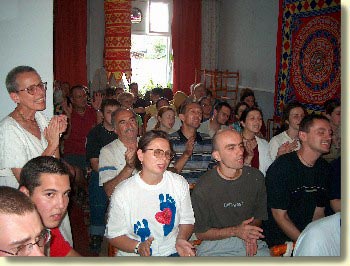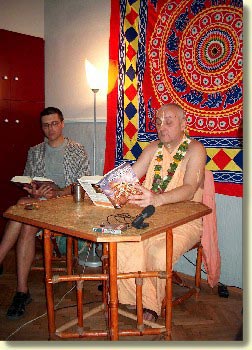 Belgrade, Yugoslavia
28 June, 2003
Belgrade, Yugoslavia
28 June, 2003
In this age, everyone is at best a
sudra.
Sudra means
laborer. Yes, a ditch-digger is a laborer no doubt. But a medical doctor is also
a laborer. He is just a mechanic who works on the body, like an auto
mechanic working on a car. And for that labor, he gets paid. A ditch-digger is
called a common laborer, whereas a doctor is an educated, qualified, specialized
laborer. But both are
sudras.
So if a
sudra requires education and qualification to be accepted in his
special field, then what to speak of a
brahmana? It often happens
that I have to stop and ask myself whether we Western devotees have a real grasp
on what it means to be a
brahmana. For example, I so often get questions
from devotees about "the proper technique" how something in devotional service
should be done, or about "the mechanism" that is behind some principle of our
philosophy. Of course there is a technical and mechanical aspect to practical
Krsna consciousness, to brahminical engagements. But just mastering technique
and mechanism does not make one a
brahmana. Such mastery may make one a
very good
sudra.
Samo damas tapah saucam ksantir arjavam eva ca, says Lord Krsna to Arjuna
about the essential qualifications of a
brahmana. "He must be peaceful,
self-controlled, clean, truthful, austere, learned, wise, and renounced. "
(
B. g. 18. 42) Peaceful means he is not agitated by so-called "needs. " Everyone
has needs in this body, but the
brahmana is not agitated by them. He does
not permit himself to be forced to go to work for others in order to satisfy bodily
needs. He remains steady in his brahminical duty and depends on Krsna. He doesn't
get a job in the factory, thinking, "It's OK, I'm a
brahmana and my father
is a
brahmana," as he tightens bolts on machinery with a greasy wrench. Again, a
sudra may not be so grossly engaged as that factory wrench-monkey. He may instead be engaged in tightening muscular tissue in a patient's body, or
even tightening up his students' understanding of physics or chemistry in the
university. But the relative refinement of one's labor is not what makes a difference
between a
brahmana and a
sudra.
Self-controlled means that the
brahmana is free of lust, anger and greed;
thus he does not engage in meat-eating, illicit sex, gambling or intoxication.
Tapah: a
brahmana is inclined to austerity. Given a choice between
filling up his belly and thus succumbing to self-satisfied complacency and dullheadedness,
or eating less but thus remaining alert, the
brahmana will prefer to eat
less. He is clean inside and outside--clean in his thoughts, clean in his habits. He always tells the truth because his mind is absorbed in the Absolute Truth:
brahmajnana iti brahmana. A
brahmana must be a
pandita,
learned. He lives by his brahminical knowledge, just as a
ksatriya lives
by his martial skills and a
vaisya lives by his business acumen. He is
not
only learned but wise, a
vijnani, which means he has realization. His knowledge
is not merely parrotted facts and figures.
Ksantih, he is tolerant. Parasara Muni began burning all the
asuras in his fire of sacrifice because
a demon had devoured his father. But when Pulastya Muni requested he forgive the
demons, Parasara did so immediately. Pulastya Muni thus acknowledged Parasara
Muni's greatness as a
brahmana and blessed him with the ability to speak
nicely from the Vedic scriptures.
Arjava, a
brahmana does
not cheat. He is
astika, he adheres to the Vedic
dharma.
Endowed with these qualities, such a
brahmana does
brahma-karma,
his
brahminical duty, as an expression of his very nature. He does not
do his
karma as a "job. " It is his nature to be fully independent
from matter and fully dependent upon Krsna. "In other words, a pure
brahmana
voluntarily accepts a life of poverty and lives in complete dependence on the
mercy of the Lord. Not very many years ago, a brahmana in Krsnanagara, near Navadvipa,
was offered some help from the local Zamindar, Vraja Krsnacandra. The
brahmana
refused to accept the help. He said that since he was very happy in his householder
life, taking
rice given by his disciples and cooking vegetables of tamarind leaves, there was
no question of taking help from the Zamindar. " (
Bhag. 6. 7. 37p)
 Blissful Belgrade devotees gathered for kirtana and Blissful Belgrade devotees gathered for kirtana and
class in a pizza restaurant operated by someone
friendly to the movement.
|
 Speak-a on da Gita at da Pious Speak-a on da Gita at da Pious
Pizzeria.
|
<< Back

 Blissful Belgrade devotees gathered for kirtana and
Blissful Belgrade devotees gathered for kirtana and Speak-a on da Gita at da Pious
Speak-a on da Gita at da Pious